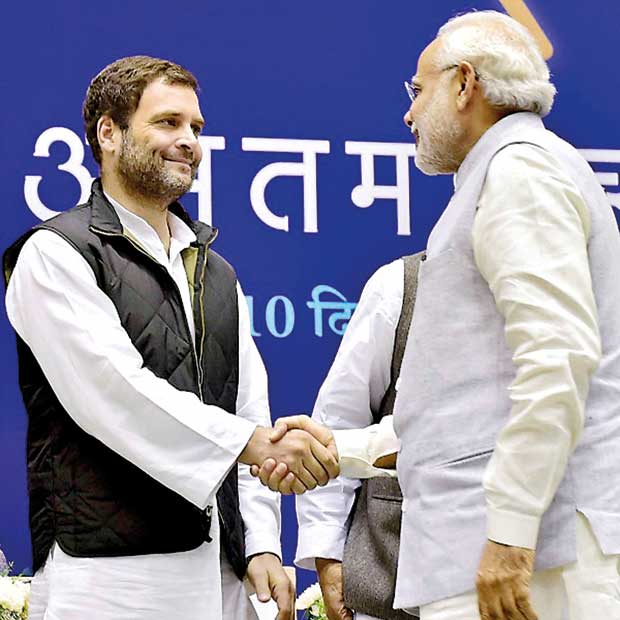Reply To:
Name - Reply Comment
Last Updated : 2024-04-27 08:30:00

Headlines in the media the world over will trumpet the victory of the Bharathiya Janata Party (BJP)-led by Indian Prime Minister Narendra Modi in the Gujarat and Himachal Pradesh State Assembly elections as a singular, unmitigated triumph over the Congress led by Rahul Gandhi and declare that the BJP’s victory in the 2019 parliamentary elections is assured.
But this will be hiding a bitter truth, which is that the BJP and its Supremo, Narendra Modi, have been badly mauled in his home ground of Gujarat by Rahul Gandhi, an opponent who has been derided and trolled as a “pappu” or a childish leader for the past few years.
Modi had to work hard, addressing 31 public rallies and covering over 6,600 km within the state to seek votes. Towards the end of the campaign he had to stoop to the level of accusing his rivals, including former Prime Minister Manmohan Singh of being Pakistani agents. The BJP’s and Modi’s sense of insecurity was palpable. The BJP was feeling the pinch of incumbency, having been in power in Gujarat since 1995.
 As regards Himachal Pradesh, anti-incumbency was indisputable. The Congress Government there was slated to go anyway and the BJP’s good performance in the Himalayan state comes as no surprise. The Congress is losing power there in the same way as the BJP lost it in 2012.
As regards Himachal Pradesh, anti-incumbency was indisputable. The Congress Government there was slated to go anyway and the BJP’s good performance in the Himalayan state comes as no surprise. The Congress is losing power there in the same way as the BJP lost it in 2012.
At the time of writing this column on Monday, the BJP was leading in Gujarat in 65 constituencies and had won 33, and the Congress was leading in 54 and had won 22. Based on this trend, the final result could be quite close, though the BJP would be able to get a simple majority to form the government.
Comparing this with the results of the last Assembly elections in 2012, the BJP had bagged 115 seats against the Congress’s 61 and was in an unassailable position. The BJP’s fall from that pinnacle is for all to see.
"The state’s history of tension between Hindus and Muslims, though the latter are only 9% of the population. The worst Hindu-Muslim riots took place in 2002 when Modi was the Chief Minister. The riots helped Modi to emerge as the Hindu “strong man”
The BJP had its advantages such as being in power since 1995, winning six successive elections. The extensive network based on patronage which power can create could be exploited in elections. Then, the BJP Supremo Narendra Modi, is a Gujarati, while Congress’s Rahul Gandhi is a non-Gujarati. The latter fact was used by Modi to press home  the point that the people had better back a “son of the soil” who will safeguard “Gujarati pride” rather than a rank outsider and a bird of passage.
the point that the people had better back a “son of the soil” who will safeguard “Gujarati pride” rather than a rank outsider and a bird of passage.
The BJP’s “Hindutwa” has had very strong resonance in Gujarat for decades, given the state’s history of tension between Hindus and Muslims, though the latter are only 9% of the population.
The worst Hindu-Muslim riots took place in 2002 when Modi was the Chief Minister. The riots helped Modi to emerge as the Hindu “strong man”, an image which has stood him in good stead even at the national level.
Sensing the anti-Muslim feeling in Gujarat, even Rahul Gandhi did not mention the plight of the Muslims in his speeches this time. He preferred to speak in general terms about the BJP’s being a “divisive” party and the Congress being a “unifying” party. In an uncharacteristic step, Rahul Gandhi worshipped at 27 Hindu temples and declared that he was a devotee of God Shiva.
But the BJP’s support base had started to erode, given the ill-effects of Modi’s de-monetization of 86% of Indian currency in late 2016 and the introduction of the highly complicated and inconvenient General Sales Tax (GST). The poor and the middle classes bore the brunt of the ill-effects of these measures.
The party, which had been campaigning on Hindu unity (the core goal of Hindutwa), was unable to understand the demand for recognition by Hindu caste groups like the Patidars and Dalits – both rural based. The Patidars had been agitating for reservation in jobs and education and the Dalits have been complaining of persecution by the upper castes. Agitations by these caste groups were put down by force by the BJP regime in Gujarat, leading to the alienation of these groups from the BJP. The BJP’s loss was the Congress’ gain.
"Modi had to work hard, addressing 31 public rallies and covering over 6,600 km within the state to seek votes. Towards the end of the campaign he had to stoop to the level of accusing his rivals, including former Prime Minister Manmohan Singh of being Pakistani agents"
As for the Muslims, the BJP had deliberately ignored them on the belief that ignoring them would help them consolidate their majority Hindu vote base. But the BJP did not bargain for a split in the Hindu votes on the basis of caste. In the process, it lost a section of Hindus while it had no support among the Muslims anyway.
In power for 22 years, the BJP had lost some of its shine and large sections of the people were looking for an alternative. Rahul Gandhi’s Congress appears to be the alternative. The Congress has fought a spirited battle and given the BJP and Modi a run for their money.
It has formed an alliance with young and up and coming grassroots level leaders like Hardik Patel (leaders of the Patidar caste), Alpesh Thakor (leader of the Backward Castes) and Jignesh Mewani (Dalit leader). All these castes are key players in Gujarat’s rural areas.
The question now is whether Modi will learn from the results of the Gujarat elections and change some of his social and economic policies or will be motivated to see the victory as a full endorsement of his existing policies and keep going the way he has been?
The answer to this question assumes significance in the light of the fact that the BJP has a parliamentary election to face in 2019 and also State Assembly elections in Rajasthan, Madhya Pradhesh, Chattisgarh and Karnataka. Presently, the BJP is in power in the first three and the Congress is in power in Karnataka.

Add comment
Comments will be edited (grammar, spelling and slang) and authorized at the discretion of Daily Mirror online. The website also has the right not to publish selected comments.
Reply To:
Name - Reply Comment
US authorities are currently reviewing the manifest of every cargo aboard MV
On March 26, a couple arriving from Thailand was arrested with 88 live animal
According to villagers from Naula-Moragolla out of 105 families 80 can afford
Is the situation in Sri Lanka so grim that locals harbour hope that they coul

26 Apr 2024
26 Apr 2024